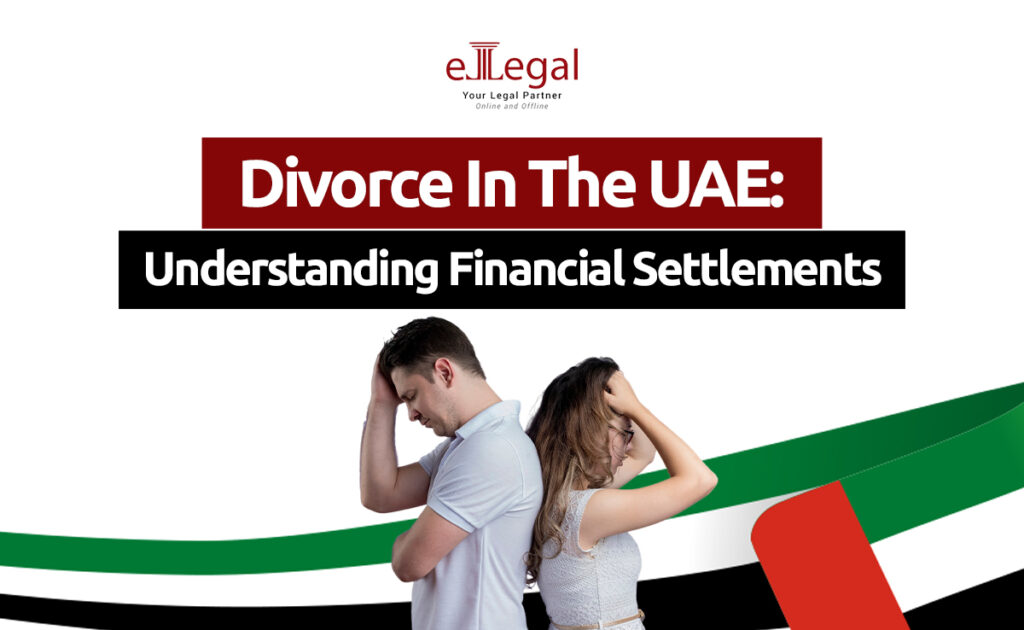Dealing with divorce can be emotionally and financially difficult, especially when it entails understanding the legal system of another country. The United Arab Emirates (UAE) has specific laws and regulations that govern divorce cases and define the rights and obligations of the individuals involved. Financial settlements, which include alimony, property division, and maintenance, are crucial aspects of these proceedings.
Alimony in the UAE
In Arabic, alimony is referred to as “Nafaqa” and it involves one spouse providing financial support to the other during and after divorce. Regarding UAE law, alimony is usually calculated considering factors like the length of the marriage, the financial requirements of the receiving spouse, and the lifestyle maintained during the marriage.
Types of Alimony In the UAE
- Nafket Eda (Waiting Period): This is the compensation the woman receives after the pronouncement of the divorce, during the waiting period (Iddah) which lasts about 3 months. The payment helps to ensure the provision of basic needs for the wife during this period.
- Nafket Motaa: (Moral Compensation) refers to a single payment given by the husband to the wife as an act of moral compensation following their divorce. The specific amount is determined by the husband’s earnings and the length of the marriage.
Taking into consideration some factors such as the duration of the marriage and standard of living, the court can apply its discretion in determining the amount based on the circumstances of each case.
Following the order of the court as regards alimony, both parties must adhere to it, failure to do so can result in legal penalties.
Per Article 64 of the UAE Personal Status Law, a wife can ask to adjust alimony payments based on changing circumstances. This includes considering the financial capability and situation of the spouse, as well as the economic conditions at the relevant time and place, provided that it meets the minimum sufficiency limit.
Property Division In The UAE:
In UAE divorce cases, the division of property entails distributing assets obtained during the marriage. The method of property division is impacted by Sharia law principles and may differ depending on individual situations and agreements between the parties. The idea that each party keeps the assets held in their names is typically upheld by judges. Shares, properties, and bank accounts that are held in joint names shall be divided equally by the court or following the percentages shown in the evidence.
After the recent amendment of Federal Law No. 5/1985 through Federal Decree 30/2020, if a couple married abroad seeks divorce in the UAE, the law of the country where the marriage occurred will govern their divorce proceedings.
Consequently, any property acquired in the UAE will also be subject to the laws governing the marriage. This amendment represents a pivotal development in divorce, separation, and asset division when marriages face dissolution.
If parties cannot agree on property division, the court may intervene to make a decision based on the circumstances presented.
Maintenance In Divorce:
Financial assistance given by a spouse to his ex-wife or children is referred to as maintenance in divorce cases in the United Arab Emirates. It is meant to support the recipient’s basic living expenditures and is distinct from alimony. Spousal Maintenance in the UAE is regulated by Federal Law No. (28) of 2005 On Personal Status, granting the wife the right to request the court to instruct her husband to provide spousal maintenance.
The husband is responsible for providing maintenance, which encompasses food, clothing, shelter, medical care, and domestic servant expenses for the wife if she is accustomed to employing a maid from her family, as well as any other associated maintenance needs. When determining the maintenance amount, the judge takes into account the financial status of the husband, the circumstances of the wife, the economic conditions, and the location.
In the UAE, apart from spousal maintenance and child support, Nafaqah is also acknowledged. Nafaqah refers to the financial assistance that a husband must give to his wife and children during marriage, covering necessities like food, clothing, shelter, and other essential expenses.
If a divorce occurs, the court may mandate the husband to continue providing nafaqah to his ex-wife and children. The court decides the amount of nafaqah based on various factors, including the husband’s income and expenses, the needs of the wife and children, and the customary standard of living during the marriage.
As per Article (67) of the UAE Personal Status Law, the husband’s obligation to provide for his wife becomes a debt from the moment he stops fulfilling it. This debt is valid and enforceable without the need for a court order or mutual agreement, and it must be fully settled or officially waived by the wife. The law stipulates a three-year time limit for claiming spousal maintenance. The wife cannot request maintenance for a period exceeding three years unless the husband consents. Additionally, the wife has the right to urgently seek temporary maintenance to be granted on an expedited basis.
In cases involving children, the father is typically responsible for providing maintenance until they reach adulthood or become self-sufficient.
Conclusion
Navigating financial settlements in UAE divorce cases requires a thorough understanding of local laws, customs, and legal processes. Seeking legal counsel is highly advisable to ensure that your rights are protected and that any agreements reached are fair and enforceable.
We at eLegal Consultants with our team of Divorce & child custody lawyers in UAE are ready to offer professional legal advice and greatly assist individuals in navigating the complexities of divorce proceedings in the UAE. Contact us today.




